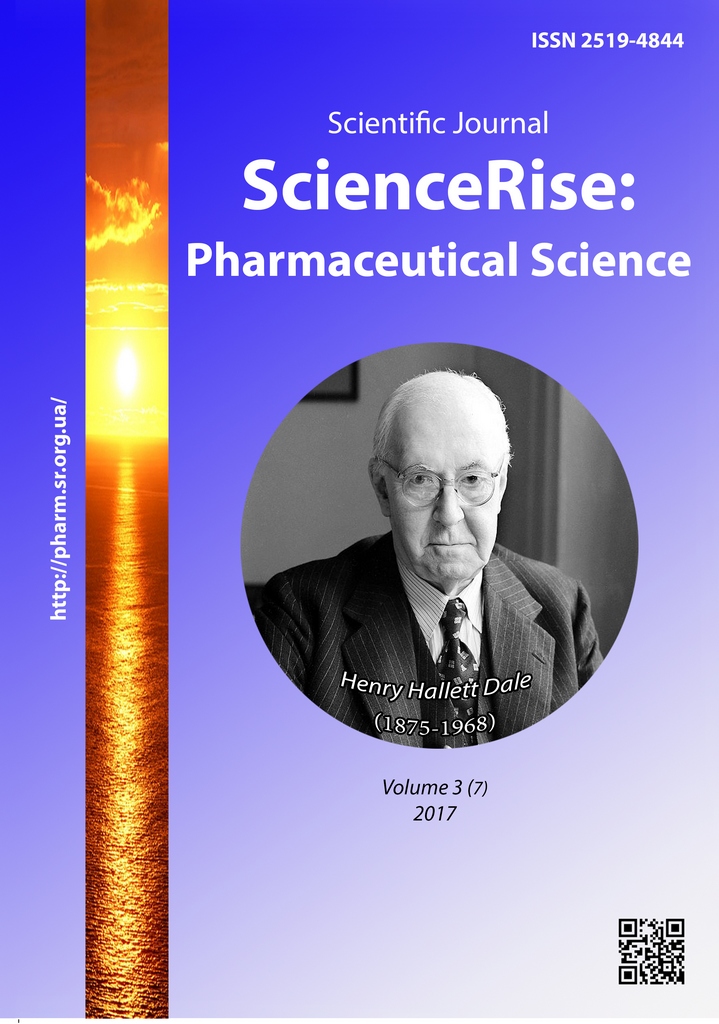The study of volatile fractions of carrot raw material of “Bright” and “Nantes Kharkiv” varieties
DOI:
https://doi.org/10.15587/2519-4852.2017.104398Keywords:
Common carrot, “Bright” variety, “Nantes Kharkiv” variety, aerial part, roots, volatile compounds, gas chromatographyAbstract
Common carrot is widely cultivated in many countries as a food plant. Raw material of this plant has antispasmodic, antibacterial, cytotoxic, antiparasitic, cardioprotective, and hepatoprotective activity.
Common carrot in non-pharmacopoeial Ukraine, therefore, it requires in-depth pharmacognostic study. In addition, research of its most common varieties in Ukraine, namely “Bright” and “Nantes Kharkiv” remains relevant.
The aim of research was determination of the volatile fractions components of aerial part and roots of Common carrot of “Bright” and “Nantes Kharkiv” varieties.
Methods. Gas chromatography method was used for determination of Common carrot volatile fractions.
Results. In result of the study, 32 compounds were identified in the volatile fraction of Common carrot aerial part of “Bright” variety, 34 compounds were determined in roots of the same sample. 20 components were found in the volatile fraction of Common carrot aerial part of “Nantes Kharkiv” variety, and in its roots 39 compounds were identified.
All the volatile fractions studied characterized by the presence of Caryophyllene and Caryophyllene oxide in high amount. Sesquiterpene alcohol Carotol was determined in all the samples studied.
Conclusion. According to the results of the given research, marker compound Carotol was found in all Common carrot objects studied. The obtained data can be used for standardization of aerial part and roots of Common carrot of “Bright” and “Nantes Kharkiv” varieties
References
- Zuzuk, B., Kucik, R., Gres'ko, I., D'yachok, V. (2005). Morkov' dikaya, morkov' obyknovennaya. Daucus carota L. (Analiticheskij obzor). Provizor, 10. Available at: http://www.provisor.com.ua/archive/2005/N10/art_37.php
- Bystricka, J., Kavalcova, P., Musilova, J., Vollmannova, A., Toth, T., Lenkova, M. (2015). Carrot (Daucus carota L. ssp. sativus (Hoffm.) Arcang.) as source of antioxidants. Acta Agriculturae Slovenica, 105 (2), 303–311. doi: 10.14720/aas.2015.105.2.13
- Al-Snafi, P. D. A. E. (2017). Nutritional and therapeutic importance of Daucus carota – A review. IOSR Journal of Pharmacy, 7 (2), 72–88. doi: 10.9790/3013-0702017288
- Meliani, N., DibMohammed El, A., Allali, H., Tabti, B. (2013). Comparative analysis of essential oil components of two Daucus species from Algeria and their antimicrobial activity. International Research Journal of Biological Sciences, 2 (1), 22–29.
- Imamu, X., Yili, A., Aisa, H. A., Maksimov, V. V., Veshkurova, O. N., Salikhov, S. I. (2007). Chemical composition and antimicrobial activity of essential oil from Daucus carota sativa seeds. Chemistry of Natural Compounds, 43 (4), 495–496. doi: 10.1007/s10600-007-0174-2
- Habegger, R., Schnitzler, W. H. (2007). Essential oils as antioxidants of different coloured carrot cultivars (Daucus carota L. ssp. sativus Hoffm.). Journal of Applied Botany and Food Quality, 81, 132–135.
- Flamini, G., Cosimi, E., Cioni, P. L., Molfetta, I., Braca, A. (2014). Essential-Oil Composition ofDaucus carotassp.major(Pastinocello Carrot) and Nine Different Commercial Varieties ofDaucus carotassp.sativusFruits. Chemistry & Biodiversity, 11 (7), 1022–1033. doi: 10.1002/cbdv.201300390
- Khalil, N., Ashour, M., Singab, A. N., Salama, O. (2015). Chemical Composition and Biological Activity of the Essential Oils Obtained From Yellow and Red Carrot Fruits Cultivated In Egypt. Journal of Pharmacy and Biological Sciences, 10 (2), 13–19.
- Acimovic, M., Stankovic, J., Cvetkovic, M., Ignjatov, M., Nikolic, L. (2016). Chemical characterization of essential oil from seeds of wild and cultivated carrots from Serbia. Botanica Serbica, 40 (1), 55–60.
- Verma, R. S., Padalia, R. C., Chauhan, A. (2014). Chemical composition variability of essential oil during ontogenesis of Daucus carota L. subsp. sativus (Hoffm.) Arcang. Industrial Crops and Products, 52, 809–814. doi: 10.1016/j.indcrop.2013.12.012
- Burda, N. E., Zhuravel, I. A., Kislichenko, V. S. (2015). Izuchenie letuchej frakcii Lentinus edodes (Berk.) Singer. Vestnik KazNMU, 4, 469–472.
- Dovhal, Ye. O., Huryeva, I. H., Kyslychenko, V. S., Zhuravel, I. O. (2016). The study of the volatile fractions composition from narrow-leaved catoptric (Typha Angustifolia L.) raw material. ScienceRise: Pharmaceutical Science, 2 (2), 46–50. doi: 10.15587/2519-4852.2016.76372
Downloads
Published
How to Cite
Issue
Section
License
Copyright (c) 2017 Darina-Marija Pazyuk, Iryna Zhuravel, Olexandra Kyslychenko, Nadiia Burda

This work is licensed under a Creative Commons Attribution 4.0 International License.
Our journal abides by the Creative Commons CC BY copyright rights and permissions for open access journals.








